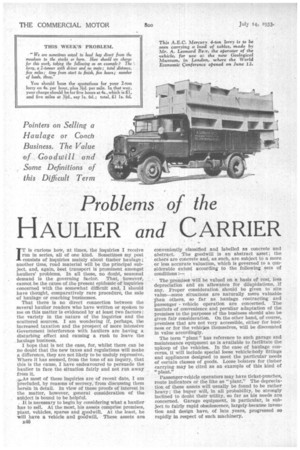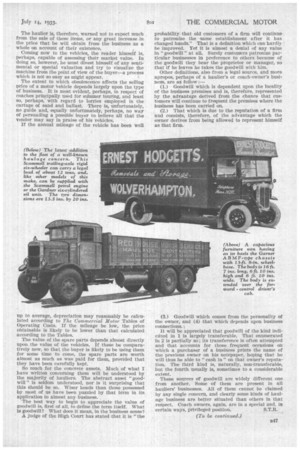Problems of the
Page 60

Page 61

If you've noticed an error in this article please click here to report it so we can fix it.
HAULIER and CARRIER
Pointers on Selling a Haulage or Coach Business. The Value of Goodwill and , Some Definitions of this Difficult Term
IT is curious how, at times, the inquiries I receive run in series, all of one kind. Sometimes ray post consists of inquiries mainly about timber haulage; another time, road material will be the principal subject, and, again, beet transport is prominent amongst hauliers' problems. In all these, no doubt, seasonal demand is the governing factor. That, however, cannot be the cause of the present epidemic of inquiries concerned with the somewhat difficult and, I should have thought, comparatively rare procedure, the sale of haulage or coaching businesses.
That there is no direct connection between the several haulier readers who have written or spoken to me on this matter is evidenced by at least two factors : the variety in the nature of the inquiries and the scattered sources. I am wondering if, perhaps, the increased taxation and the prospect of more intensive Government interference with hauliers are having a disturbing effect and causing a rush to leave the haulage business.
I hope that is not the case, for, whilst there can be no doubt that the new taxes and regulations will make a difference, they are not likely to be unduly repressive. Where it has seemed, from the tone of an inquiry, that this is the cause, I have endeavoured to persuade the haulier to face the situation fairly and not run away from it.
46,As most of these inquiries are of recent date, I am precluded, by reasons of secrecy, from discussing them herein in detail. in view of these proofs of interest in the matter, however, general consideration of the subject is bound to be helpful.
, It is necessary to begin by considering what a haulier has to sell. At the most, his assets comprise premises, plant, vehicles, spares and goodwill. At the least, he will have a vehicle and goodwilL These assets are B46
conveniently classified and labelled as concrete and abstract. The goodwill is an abstract asset; the others are concrete and, as such, are subject to a more or less accurate valuation, which is governed to a considerable extent according to the following sets of conditions :—
The premises will be valued on a basis of cost, less depreciation and an allowance for dilapidations, _if any. Proper consideration should be given to site value—some situations are naturally more valuable than others, so far as haulage contracting and passenger vehicle operation are concerned. The matters of convenience and peculiar adaptation of the premises to the purposes of the business should also be given fair consideration. On the other hand, of course, premises that are not very accessible, either for business or for the vehicles themselves, will be discounted In value accordingly.
The term "plant" has reference to such garage and maintenance equipment as is available to facilitate the upkeep of the vehicles. In the case of haulage concerns, it will include special loose vehicle-body fittings and appliances designed to meet the particular needs of certain classes of goods. Loose bolsters for timber carrying may be cited as an example of this kind of "plant."
Passenger-vehicle operators may have ticket-punches, route indicators or the like as "plant." The depreciation of these assets will usually be found to be rather heavy ; the buyer will, in all probability, be strongly inclined to doubt their utility, so far as his needs are concerned. Garage equipment, in particular, is subject to fairly rapid obsolescence, largely because invention and design have, of late years, progressed so rapidly in respect of such machinery. The haulier is, therefore, warned not to expect much from the sale of these items, or any great increase in the price that he will Obtain from the business as a whole on account of their existence.
'Coming now to the vehicles, the reader himself is, perhaps, capable of assessing their market value. In doing so, however, he must divest himself of any se timental or special valuation and try to visualize he machine from the point of view of the buyer-7-a proc s which is not so easy as might appear.
The extent to which obsolescerice affects the selling price of a motor 'Vehicle depends largely upon the type of business. It is most evident, perhaps, in respect of coaches principally used for suinmer touring, ,and least so, perhaps,with regard to lorries employed in the cartage of sand and ballast. There is, unfortunately, no guide and, equally unfortunately, perhaps, no way of persuading a possible buyer to believe all that the vendor may say in praise of his vehicles:
If the annual mileage of the vehicle has been well
up to average, depreciation may reasonably be calculated, according to The Commercial Motor Tables of Operating Costs. If the mileage be low, the price obtainable is likely to be lower than that calculated according to the Tables.
The value of the spare parts depends almost directly upon the value of the vehicles. If these be comparatively new, so that the buyer is likely to be using them for some time to come, the spare parts are worth almost as much as was paid for thein, provided that they have been carefully kept.
So much for the concrete assets. Much of what I have written concerning them will be understood by the majority of hauliers. The abstract asset "goodwill" is seldom understood, nor is it surprising that this should be so. Wiser heads than those possessed by most of us have been puzzled by that term in its application to almost any business.
The best way to begin to appreciate the value of goodwill is, first of all, to define the term itself.. What is goodwill? What does it mean, in the business sense?
A. judge of the High Court has stated that it is "the probability that old customers of a firm will continue to patronize the -same establishment after it has changed hands." That is a definition which can hardly be improved. Yet it is almost a denial of any value in "goodwill" at all. Surely customers patronize particular businesses in preference to others because of the goodwill they bear the proprietor or manager, so that if he leaves he takes the goodwill with him.
Other definitions, also from a legal source, and more apropos, perhaps of a haulier's or coach-owner's business, are as follow : (1.) Goodwill which is dependent upon the locality of the business premises and is, therefore, represented by the, advantage derived from the chance that customers will continue to frequent the premises where the business has been carried on.
(2.) That which is due to the reputation of a firm and consists, therefore, of the advantage Which the owner derives from being allowed to represent lainnself as that firm.
(3.) Goodwill which comes from the personality of the owner, and (4) that which depends upon business connections.
It will be appreciated that goodwill of the kind indicated in 1 is largely transferable. That enumerated in 2 is partially so; its transference is often attempted and that accounts for those frequent occasions on which a purchaser of a business prints the name of the previous owner on his notepaper, hoping that he will thus be able to "cash in', on that owner's reputation. The third kind is, naturally, non-transferable, but the fourth usually is, sometimes to a considerable extent.
These sources Of goodwill are widely different one from another. Some of them are present in all hauliers' businesses. All of them cannot be claimed by any single concern, and clearly some kinds of haulage business are better situated than others in that respect. Coach owners, again, are in a special and, in certain ways, Privileged position. S.T.R..
(To be continued.)




























































































